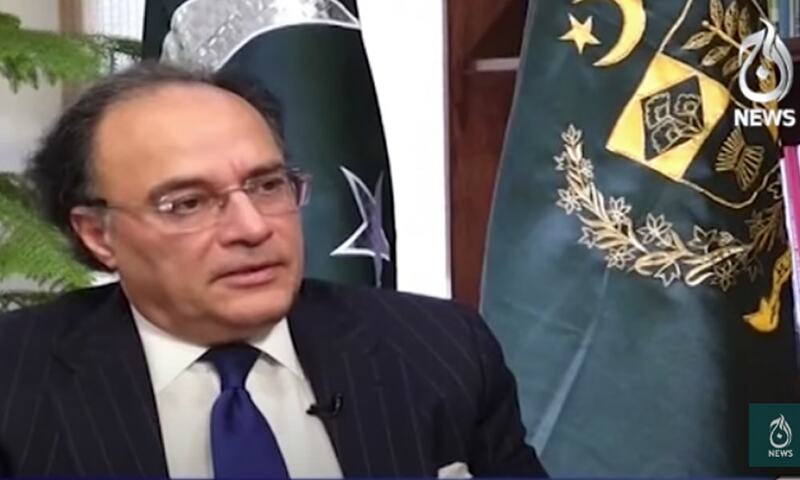ISLAMABAD: Finance Minister Muhammad Aurangzeb has stated that maximum possible relief has been provided to low- and middle-income earners in the 2025-26 budget. He said the government may be forced to impose additional taxes worth Rs400–500 billion if it fails to meet revenue targets through enforcement of existing budgetary measures taken in the Budget 2025-26.
In an exclusive interview on Aaj TV’s Spot Light with Munizae Jahangir, Aurangzeb emphasized that the FY26 budget is focused on enforcing already announced measures rather than introducing new ones.
“It (budget FY26) is less about additional measures. It is more about the enablement around enforcement,” the finance minister said. He projected that the government plans to generate Rs389 billion in additional revenue in FY26 through improved enforcement.
Budget 2025-26: Pakistan govt offers tax relief to salaried class, but representatives unhappy
“If some of those things (collection through enforcement) don’t move forward then I think we all have to agree that we have to impose additional taxes of Rs400–500 billion. There is a very clear trade-off,” he said.
Aurangzeb, who has repeatedly highlighted the economic burden of pensions, particularly the over Rs1 trillion paid annually from the national exchequer, revealed ongoing discussions with the Ministry of Defence to reform military pensions.
“The service structure in the military stands entirely different from the one in the civil bureaucracy. They retire in 30–35 years. So the discussion (for military pension reforms) with them is in progress in terms of how we take it forward,” he said.
“We have increased pensions across the board including civil bureaucracy. At the same time, we have initiated pension reforms, starting from the civil bureaucracy starting from July 1 last year.”
The finance minister also disclosed that Prime Minister Shehbaz Sharif will soon announce additional financial resources to address Pakistan’s water scarcity. This will be over and above the Rs133 billion already allocated in the FY26 budget for water availability.
“Water has been weaponized by India,” he claimed.
He added that allocations made for the Diamer-Bhasha and Mohmand dams are aimed at enhancing Pakistan’s water storage capacity. “We are 15–30% short on the threshold of the required water storage capacity,” he said. “In the next coming day, you will hear a specific announcement (on new allocation for water availability) coming directly from the Prime Minister.”
Aurangzeb also responded to criticism that governments have failed to tax the agriculture sector, clarifying that provinces have already enacted legislation in this regard.
“The (agriculture tax) collection is to be started from July 1,” he said.
He acknowledged that the federal government should have maintained a buffer stock of wheat for food security, but remained committed to withdrawing state intervention from the agriculture market.
“We expect revival in major crops (like cotton, wheat, maize, sugarcane, rice) and see rebound in agriculture next year,” he said, while defending the government’s move to stop procuring strategic reserves and announcing support prices.
“The government has no intervention in rice and maize. It has to come out from sugar and wheat as well. We have to look forward. We have to invest in storage capacity building and electronic warehouses. The Punjab government is taking the lead. The entire value chain should be deregulated and we are on the way.”
Despite a 13.5% decline in major crops, Aurangzeb said that the livestock and poultry sectors have performed well in FY25.
Commenting on Pakistan’s relationship with international creditors, Aurangzeb confirmed that the FY26 budget aligns with discussions held with global financial institutions, including the International Monetary Fund (IMF), under the ongoing $7 billion Extended Fund Facility.
He also revealed that the government agreed with the IMF not to impose previously considered taxes on pesticide and fertilizer in FY26.
Addressing concerns in the real estate and construction sectors, Aurangzeb explained recent tax changes: “We have lowered taxes for buyers through removing FED (Federal Excise Duty), but simultaneously increased tax for sellers in the same way as capital gains tax.”
He clarified that removing the 7% FED on property transactions—originally levied on food, not construction—reduces the transaction cost for buyers, while increased capital gains tax on sellers ensures no revenue loss for the government.
The finance minister also hinted at further relief in electricity prices. “The government has already reduced energy prices by Rs7 per unit and more price cuts in the energy sector are expected ahead,” he said.
Copyright Business Recorder, 2025
